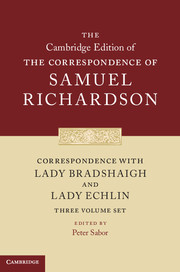Book contents
- Frontmatter
- Contents
- General Editors’ Preface
- Acknowledgements
- Chronology
- List of Abbreviations
- General Introduction
- Volume I Richardson’s Correspondence with Lady Bradshaigh and Lady Echlin, 1748–1753
- Volume I Richardson’s Correspondence with Lady Bradshaigh and Lady Echlin, 1748–1753
- Volume II Richardson’s Correspondence with Lady Bradshaigh and Lady Echlin, 1754–1757
- Volume II Richardson’s Correspondence with Lady Bradshaigh and Lady Echlin, 1754–1757
- Volume III Richardson’s Correspondence with Lady Bradshaigh and Lady Echlin, 1758–1762
- Volume III Richardson’s Correspondence with Lady Bradshaigh and Lady Echlin, 1758–1762
- Appendix I Lady Bradshaigh’s and Samuel Richardson’s Commentary on Clarissa
- Appendix II Lady Bradshaigh’s and Samuel Richardson’s Commentary on Sir Charles Grandison, Volume VII
- Appendix III Lady Echlin’s Alternative Ending for Clarissa
- Index
General Introduction
Published online by Cambridge University Press: 16 July 2022
- Frontmatter
- Contents
- General Editors’ Preface
- Acknowledgements
- Chronology
- List of Abbreviations
- General Introduction
- Volume I Richardson’s Correspondence with Lady Bradshaigh and Lady Echlin, 1748–1753
- Volume I Richardson’s Correspondence with Lady Bradshaigh and Lady Echlin, 1748–1753
- Volume II Richardson’s Correspondence with Lady Bradshaigh and Lady Echlin, 1754–1757
- Volume II Richardson’s Correspondence with Lady Bradshaigh and Lady Echlin, 1754–1757
- Volume III Richardson’s Correspondence with Lady Bradshaigh and Lady Echlin, 1758–1762
- Volume III Richardson’s Correspondence with Lady Bradshaigh and Lady Echlin, 1758–1762
- Appendix I Lady Bradshaigh’s and Samuel Richardson’s Commentary on Clarissa
- Appendix II Lady Bradshaigh’s and Samuel Richardson’s Commentary on Sir Charles Grandison, Volume VII
- Appendix III Lady Echlin’s Alternative Ending for Clarissa
- Index
Summary
Richardson and Lady Bradshaigh
In mid-July 1748, some six weeks after the publication of volumes III and IV of Clarissa, Richardson received, via one of his London booksellers, a letter bearing a Warrington postmark from an anonymous lady. About two weeks later, she wrote to him again. These letters are not extant, but their contents were summarized by the first editor of Richardson's correspondence, Anna Laetitia Barbauld. In Barbauld's account, the lady informed Richardson of a rumour that Clarissa ‘was to end in a most tragical manner, and, expressing her abhorrence of such a catastrophe, begged to be satisfied of the truth by a few lines inserted in the Whitehall Evening Post’. Evidently intrigued by this unknown new correspondent and her indirect way of communicating with him, Richardson complied with her request, sending a letter to the newspaper in which he asked for her name and address and offered to discuss with her his novel in progress. In her reply, her first extant letter to Richardson, the unknown correspondent used, apparently for the first time, the pseudonym ‘Belfour’, echoing the name of Belford, Lovelace's principal correspondent and confidant in Clarissa.
The mysterious Belfour's letter ends with a memorable curse. If, she told Richardson, he failed to bring the novel to a happy ending:
May the hatred of all the young, beautiful, and virtuous, for ever be your portion! and may your eyes never behold any thing but age and deformity! may you meet with applause only from envious old maids, surly bachelors, and tyrannical parents! may you be doomed to the company of such! and, after death, may their ugly souls haunt you!
Although Richardson might ‘think all this proceeds from a giddy girl of sixteen’, the writer, she assured him, was ‘past my romantic time of life’. Over the next thirteen years, until his death in July 1761, Richardson would exchange several hundred letters with Belfour, who revealed her identity only in February 1750 and who met him at last a month later, on Birdcage Walk adjoining St James's Park, during one of her periodic winter visits to London. The assignation was fraught with anxieties. As Barbauld writes, ‘No lover ever expected his mistress with greater ardour than the grave Richardson seems to have felt for his incognita, when he paced so fruitlessly up and down the Mall, gazing with expectation at every lady he met.’
- Type
- Chapter
- Information
- Correspondence with Lady Bradshaigh and Lady Echlin , pp. xxxvi - lxivPublisher: Cambridge University PressPrint publication year: 2016



